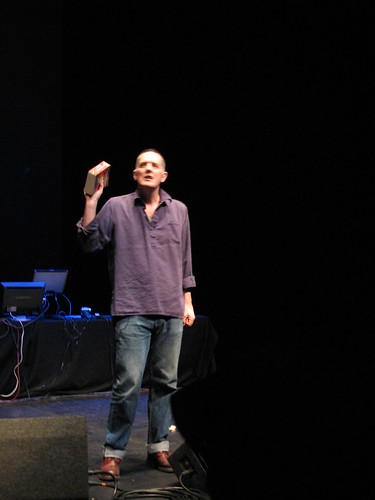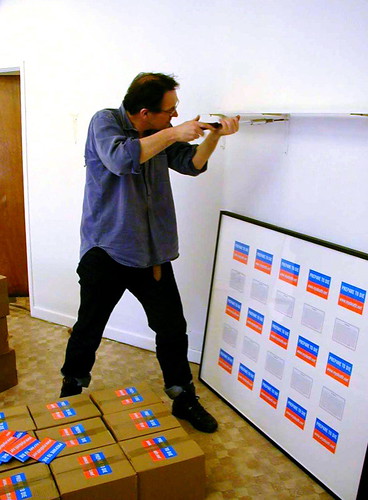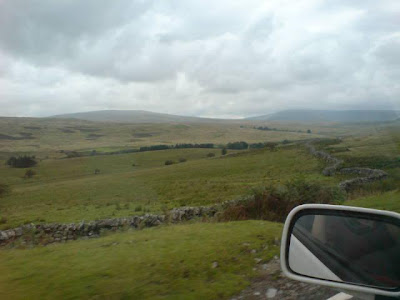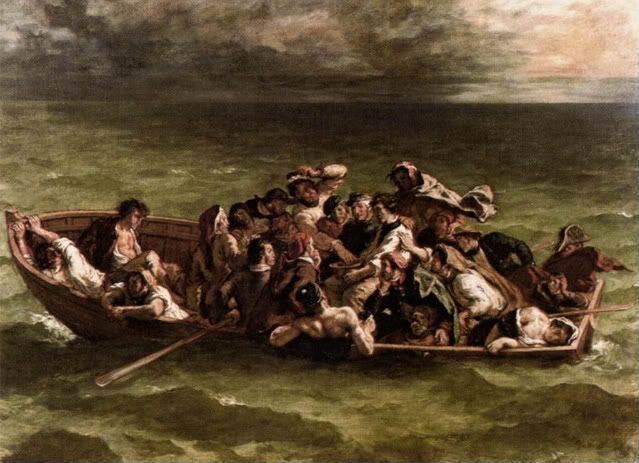For the last four days I've been in Paris, whence I returned yesterday. I was originally going to see The Divine Comedy, but then the show sold out. I wanted to see my friend M. and his family, though, so I decided to go anyway, then queue for a ticket to the band.
First of all, let me say that the Parisians definitely know how to design a public space. This is the front of Gare du Nord train station, where I arrived and from where I left:

To me that station says, "Travel is a serious and special undertaking." There's none of that tired smallness you sometimes encounter in American train stations, or even the relative austerity that you get. As you walk around Paris you realise that the French government and French church never designed a public space that they didn't then cover with elaborate decoration. Travel, government, church-going, culture: all these are occasions of importance and grandeur, and reasons for celebrating, to the French. And I concur. Here is the Paris Opera, which M. loves, but which even I think is a bit much: to me, it looks like an overdecorated cake:
And, in the tradition of my fascination with the tops of English buildings, on the right is an apartment building edifice that one could only find in France. Whereas on the left is one, from maybe 50 yards away, that you could just as easily find in New York.

Anyway, because I was somewhat in a tizzy from leaving for Paris relatively soon after arriving in Cambridge, and returning two days before I go to Manchester for the day, which is itself two days before I change rooms, I forgot certain items, chief among them my guidebook and my map. This meant that my activities in Paris were somewhat limited, as I refused to buy a new guidebook (the one I have is an Eyewitness Guide, and - heads up: product placement - absolutely fabulous, but rather pricey) and kept forgetting to buy a map. So I went to the Louvre. Fortunately, it happens that my very favourite Paris sight is at the Louvre:
I love that pyramid! In this case, I really don't know why.
Inside the Louvre, too, I found some things to enjoy. This painting, which I love because of the absolute clarity of its representation, as well as the extraordinary eerie light in the back (also, those are some dead people in the foreground, and I always find dead people interesting):
This monument, which has been one of my favourite pieces of art since I saw it the last time I was in Paris:

And this painting of the three Graces. Being rather overly gifted in the bottom department myself, I am always heartened to see paintings that seem to appreciate the ample female posterior. This one makes no bones about that preference (as it were), and rightly so, say I:
But let us not kid ourselves. Paintings are pleasant; architecture can make the mind and heart soar; but it's The Divine Comedy that's the meat of this entry...
Having no ticket, I queued up outside the venue at 5:30. In front of me there was a first small and then large knot of Divine Comedy obsessives. They had come over from England to see the band, and they seemed to follow him for every concert. Wow, it's like people who follow the Dead, except they follow the Comedy (which is better, I suppose). Now, I've never understood this. I frankly admit that I'm an obsessive person, and I frankly admit that I like repetition. But it seems to me that this kind of obsessive repetitive viewing of one band in concert would destroy, rather than enhance, the experience. Surely part of what makes a concert exciting is the sense of delight that you're seeing this band, this band the seeing of which is a special event. On any given tour the set list doesn't change that much, and to some degree the banter is honed as the tour progresses. Each show will be different, and there will be spontaneity, of course, but it doesn't seem to me that the difference and the spontaneity would be sufficient to outweigh the repetition of other elements. It seems to me that you would move pretty quickly from, "Oh, there's The Cure!" to "Oh, there's The Cure...," and to me that destroys something. But perhaps that's what followers like. You become blasé, you become knowing, and so you become in the know, one of the elite.
In any case, there they all were. But they already had tickets. I and the 25 or so people behind me did not. It was tense, I confess. It turns out, though, that in France venues are required to keep a certain percentage of tickets back, precisely to sell on the day to those who show up hoping. Huzzah! for socialism and egalité! I got in to see The Divine Comedy!
Now, I need to explain at this stage that I've actually already seen them once. In 2001, which I think might have been the last time the DC were a band proper, they recorded an album

called Regeneration. This is an anomalous album. Apparently, the rest of the band got tired of the suits and the arch lyrics (doesn't he look arch even just in that photo there?), and in an attempt to stretch and to appease them Neil Hannon...what?...agreed to (?) a very different sort of cd, one that was much more earnest and down-to-earth. This is probably my least favourite DC cd, although it does include the song "Eye of the Needle," in which Hannon waits in church for God to speak to him
(They say that you'll hear him
If you're really listening
And pray for that feeling of Grace.
Well, that's what I'm doing;
Why doesn't he answer?
I've prayed 'til I'm blue in the face)
and observes his fellow worshippers in a wonderful quatrain:
The cars in the churchyard are shiny and German,
Completely at odds with the theme of the sermon;
And all through communion I stare at the people,
Squeezing themselves through the eye of the needle.
In any case, in support of this cd Neil Hannon did a "one man and his guitar" tour (I believe the band had disbanded at this stage). In the States, where I saw him, he came as support to Ben Folds. No one gave one tiny damn who he was; they were there to see Ben Folds. I, however, gave many large damns who he was, stood at the very front, and stored the whole experience up, because I thought it would be my only time. And I think it was because I thought it would be my only time, and because it was such a distinctive experience for me, that I expected this gig to be the same: somehow I got it into my head that it would be Neil Hannon and his guitar, t-shirt and jeans and longish hair.
It was nothing like that. First of all, Neil Hannon dressed nothing like that. Indeed, he dressed in a manner so absolutely bizarre that I don't believe I could have imagined it. I don't mean he dressed like David Bowie in Ziggy Stardust; rather, he dressed exactly like your fourth grade teacher, if your fourth grade teacher had dressed like a geek. He wore: a pink shirt and a tie with black and silver horizontal stripes. Over that he wore a navy blue cardigan - just let me repeat that: a cardigan. Over that he wore a corduroy sport jacket. Yes, a shirt and tie, a cardigan, and a sport coat. He wore chino-cut trousers in what appeared to be some sort of rayon or polyester mix (because they were soft rather than stiff), and leather-soled dress shoes. Oh, and sunglasses. I'm willing to believe that this outfit was some kind of ironic statement, but I'm mostly willing to believe it because I cannot imagine any pop singer who would wear that outfit onstage unironically (and because of the sunglasses, which were quite cool). Still, most outfits of this type that are ironic include drainpipe trousers or drainpipe jeans, not what I and my friend Terrence Tucker would have to call slacks. But perhaps it was that kind of irony that's so cutting edge that it's deadly serious to those who don't know it's ironic. And to be fair, when he came on stage he said, "Ah, C&A," and it did look exactly like the sort of outfit you'd buy at C&A. And Paris does have one of the last few C&A's, so maybe he bought it there for nostalgia value. Still, my mind was boggled. And yours will be, too!


Compare these photos to the one above. Neil, do you want a job teaching English literature at the university level fifty years ago?
(I have a suspicion about the sunglasses. About five years ago I experienced a sudden problem with glare; I started finding certain light glaring that I never had before. I think this might be one of the first permutations of eye-aging. I thought perhaps he was starting to experience the same problem - he's two years younger than I - and with stage lights it would be particularly blinding. So perhaps... )
Also, he was short. He was so small that I briefly thought he was the same size as me, but because I just can't believe that any man my age who hasn't been deprived of nutrition would be 5'2" (157 cm, my European friends), I finally decided that he must be somewhere between 5'4" and 5'6". But he looked so small. For me, at least, it's very rare to see an adult about whom I think, That person is short. Like, really, properly, short. But Neil Hannon looked like that. Not that I cared. He could have been 4'11" and I would have adored him, because his size became an utter irrelevancy in the presence of his completely delightful selfhood (which we'll get to).
Okay, so how else was it different? Well, there was a band. Of course, I knew there would be a band, but I didn't realise, somehow, the difference a band would make. The sound was much louder, and fuller, and thus the presence of the experience was much more immediate and much stronger. I had been there when it was Neil Hannon and his guitar, but this time I was there. Ah! I thought when he came on stage and they started playing, Here he is! (And for just a minute I understood what propels those people to follow the Comedy: it's the moment when he comes on stage and you think, That's what he looks like. But for me that moment would cease to appear after I'd seen him four or five times in quick succession.) And again and again as they played, when they did a song I knew and loved, I would think, This is it! This is it! In all its fullness and completion, as vivid and present as it is on the cd. (of course I didn't think that last sentence, but that's what the feeling was, translated into words.)
And not only was there a band that supplied this feeling, but it was a band the male members of which seemed to have been selected solely for my viewing pleasure. All of them were pale men with dark or dark and greying hair, with those long narrow noses that delight me (being as they are second only to the slightly too long, vaguely hooked ones. Such a one as Neil Hannon has himself, in fact). Cheers, Neil!
Guitarist
Small but distinct version of pianist
And, after all that - or with all that - he was a delight. First of all, he tried to speak in French the whole time. Indeed, he spoke in French most of the time. But he spoke French with the accent and intonation of someone who has learned phrases from a book, or perhaps by imitating someone else four or five times. This is to say, he spoke. Like.....................this, and as if the French words were English words (so that, for example, "d'accord," which should be pronounced with the final d silent and the final r fading into the back of the throat, he pronounced "dacore"). I by no means have a French accent, or much vocabulary, but having spent a day and a half in France, listening to French people, it was very very funny to hear this Anglo-Irish pronunciation. Particularly once I began to suspect that he had it all written out in the looseleaf binder on the music stand in front of him, to which he referred devotedly, and particularly because when he messed up he would screw up his face and go, "Oh, [under his breath] fuck!"

So what did he play? Well, he played many French songs. One of these was the French Eurovision entry for 1965, "Poupee de cire, Poupee de son," which won that year, and which was written by Serge Gainsbourg. He also performed another
Serge Gainsbourg song (in this clip you can hear his terrible accent), a Francoise Hardy song,
"Joe Le Taxi, Your science teacher rocks out to
un chanson
Yes, yes, I hear you say, but what did he play of his own? Ah, well...He played an unexpected one, "If," but that was quite late in the performance. He played "National Express" (my least favourite DC song), but that was the encore. He played "The Summerhouse," an early one, but not as early as "When the Lights Go out All Over Europe," from Promenade, which he also played. From his more recent songs, he chose "A Lady of a Certain Age," which I think is one of his saddest. It's about an elderly woman who's had a life that should have been wonderful and fulfilling but instead, the tone makes clear, was empty and disappointing. She now lives in the South of France, and each verse ends with the lines,
And if a nice young man would buy you a drink,
You'd say with a conspiratorial wink,
"You would think that I was ----three,"
And he'd say, "No, you couldn't be"
but in each verse the age is ten years younger (first 70 [which makes the rhyme], then 63, then 53), and the intonation of the young man's utterance changes, so that the first time he say, "No! You couldn't be!" and the last time, "No. You couldn't be." It's a
sobering descent.
He also sang "Becoming More Like Alfie," which is the first DC song I ever fell in love with. I was introduced to The Divine Comedy in the best way possible: by a person I loved. I read an article about
Promenade, bought the cd, didn't like it, and years later my then-boyfriend bought
Casanova (a lyrically richer album), and when I said, "I don't like the Divine Comedy," he put it on, and I was
silenced. "
Something for the Weekend" (which, alas, was
not played in Paris) was the very first song, and it was funny, and clever, and had a surprise ending. It also has a wonderful beginning, with two girls giggling, and a wonderful middle, with Neil Hannon saying in a louche purr, "Oh, come on! You know you want to..." You wouldn't think it could get better than
that, but "Becoming More Like Alfie"
is even better, beginning as it does with a sample of Michael Caine, and including one of the weirdest lyrics ever penned: "Everybody know that no means
yes, / Just like glasses come free on the NHS." ???? I've loved
the song ever since I first heard it, and this summer I suddenly loved it much more, because listening to it one day I had one of those strange moments where you really hear a lyric for the first time, after having heard it a thousand thousand times before. In this case, what I heard was:
Once there was a time when a kind word could be enough,
And once there was a time when I could blindfold myself with love;
But now, now I'm resigned to the kind of life I'd reserved
For other guys, less smart than I:
You know, the kind who will always end up with the girls...
I had just been disappointed in love for apparently arbitrary reasons myself, and listening to those lines I suddenly realised concretely for the first time that men, too, have the experience of watching someone inferior walk away with the sexual prize, of raging over why the less deserving nonetheless get the brass ring. It was also the first time I noticed that the lyric was an admission that Hannon, at least, had been willing to accept crumbs off a table and to hang on in one-sided desire. Both of these were experiences I had associated solely with women, and more specifically with myself, so it was illuminating and humbling to find them connected to men.
He also sang, "Our Mutual Friend." Perhaps best of all, he finished as he always finishes, with
"Tonight We Fly" (sorry about the Spanish subtitles in this clip, but I love the sweet smile he gives in the beginning, and I do think this is the best performance on youtube). This is a song of such grace and loveliness that I do believe it's my favourite Divine Comedy song. Perhaps I like it because, I suspect without knowing it, it contains a reference to
Le Diable Boiteux, an eighteenth-century French novel in which a devil leads a man on a night flight over Paris, lifting the roofs off the houses to show the sin within - this novel, and the character, mentioned in a Byron letter in reference to himself. Perhaps I love it because of its soaringly beautiful melody. I think I do love it for the latter reason, but mostly I think I love it because it contains a very hard to master list of all the different people "we" see (and I love lists, and things that are hard to master [oh, matron!]), and because of its lovely, poignant lyrics,
Tonight we fly
Over the chimney-tops, skylights, and slates,
Looking into all your lives
And wondering why
Happiness is so hard to find.
I know it's silly, I know it is, but I've been so unhappy lately that I couldn't help feeling those lines deeply, thinking to myself, It is, it is so hard to find. Why? You would think it would be a simple matter.
Even more than those lines, however, I love the final ones:
And when we die
Will we be that disappointed or sad
If heaven doesn't exist?
What will we have missed?
This life is the best we ever had.
First of all I like them because, although Hannon is often pointed to as an atheist, this suggests that he is rather an agnostic, a position I find much more intellectually admirable, admitting as it does that one just can't know (the opening lines of "Eye of the Needle," above, suggest this too). But that's not really why I like them. I really like them because always at the end of the final line I think to myself, Yes. That's true. Life is wonderful, and there could be none better. God love you, Neil Hannon, you make me an optimist!
And yet despite all these transports and delights and wonders (which they truly were), the best moment of the evening was not musical at all. It came when he forgot which song he was supposed to perform next and, turning away from the microphone, he said (apparently to his pianist): "I'm all of a fluster." I suspect he did mean this to be heard, so I also suspect that this is not an expression Neil Hannon uses in everyday life, but, God, I hope it is! It's so self-parodic that it cannot but be charming. I laughed and laughed over it, and am laughing over it still. I have decided to use it all the time.
So there you are. The Divine Comedy made my trip to Paris. It was, as Neil Hannon himself would say, a joy.
And wait! Who is this standing in front of the Louvre pyramid...?
A Brief Paean to Music Itself
Sometimes I think about how lucky I am. When I think about that, I think about my career, my skin, the fact that lots of people like me, the fact that I have thick hair... I never think about music. But sometimes when I listen to music, I think, I am so lucky to love music this much. What a gift I have in music like The Divine Comedy's, like New Order's, like The KLF's! I occasionally play that game, If You Could Only Take Books or Music to a Desert Island, Which Would You Take? and the answer is always: music. Literature is good; it's interesting, and sometimes it transports and amazes. But very very good music always does that, and instantly. It grabs you by the stomach or the air in your lungs and pulls you up and out, putting in your mouth nameless marvels that just defy the ability of utterance. It makes you promises that it keeps, but that you can't explain to anyone else. How lucky am I to have that?
 that, though; I went to visit a friend. Nonetheless, let me take a moment to say that Manchester has some stupendous Victorian buildings. Of which you can see one there on the left.
that, though; I went to visit a friend. Nonetheless, let me take a moment to say that Manchester has some stupendous Victorian buildings. Of which you can see one there on the left.
































